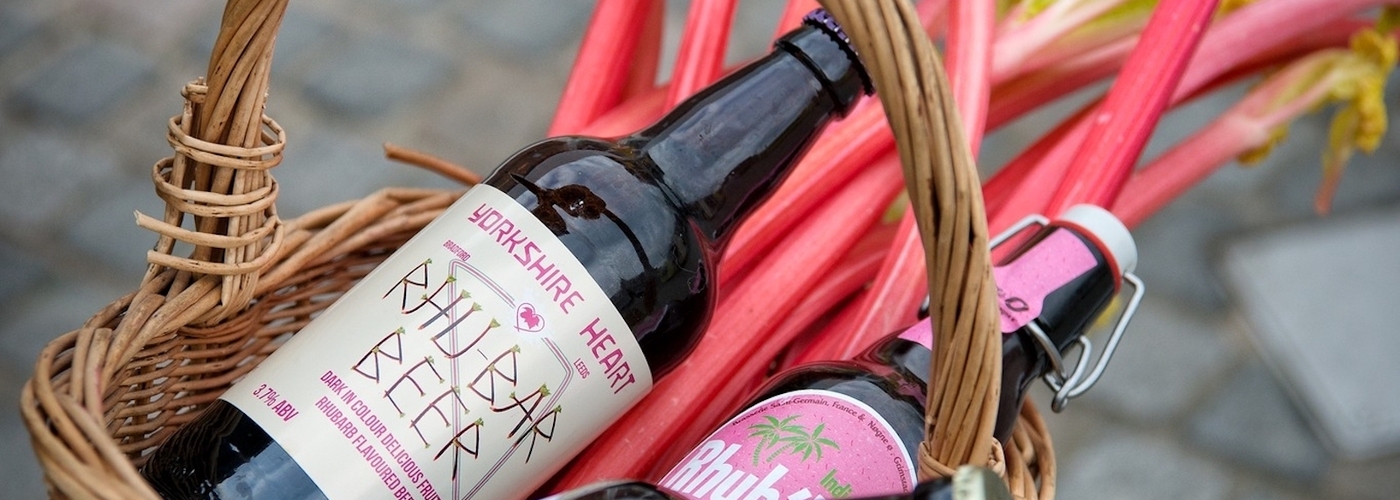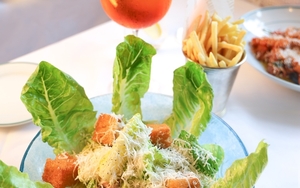It’s not nonsense for the farmers, chefs and suppliers celebrating the wonderful pink produce across the Yorkshire Rhubarb Triangle this season
It’s the phrase to mutter when asked to create inaudible background chatter on stage; a favourite of Mrs Beeton ‘cut slantwise’ and stewed slowly in sugar under a suet crust; and a vegetable that’s surprisingly easy to grow, (once you figure out which way up to plant the crown); but did you know that this agricultural phenomenon has firm roots in West Yorkshire soil?
In fact, ninety percent of the world’s Winter forced rhubarb was once produced in a nine square mile radius between Wakefield, Morely and Rothwell.
Workers still harvest by candlelight to preserve the vivacity of the curled yellow leaves
Who would have thought that our cold, damp climate was good for - anything? But these slender pink stems are actually native to Siberia, where the harsh conditions and nitrogen-rich fields force a hardy, frost-resistant crop.
Originally imported by the Romans, Rhubarb began its long journey to Europe along the Silk Road, but back then it never occurred to anyone to eat the stalk. It was the roots that were prized in Chinese Medicine as the answer to various stomach and liver complaints, and to this day, it’s still prescribed in Germany to relieve common symptoms of menopause.
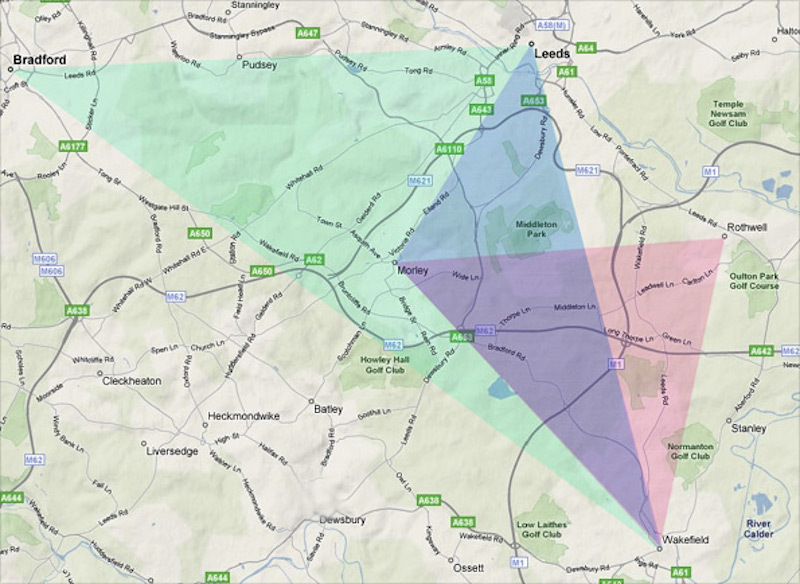
Popularity in Britain grew during the reign of Queen Victoria, who even managed to get a variety named after her, before the forcing technique was aptly discovered in the home of horticulture – Chelsea, in 1817. Witnessing how the dark manure cover gave way to sweet delicate shoots, it was the Whitcliffe family of Leeds that began erecting the first forcing sheds to cultivate Rhubarb for the mass market.
And so the Rhubarb Triangle was born. Miners started building barns on land fertilized by waste from local textile mills, and by the 1920’s there were over two-hundred growers throughout the ‘pink patch’. As the Rhubarb revolution grew across region, a dedicated express train from Ardsley Station shipped tonnes of the stuff to Covent Garden, each and every weekday.
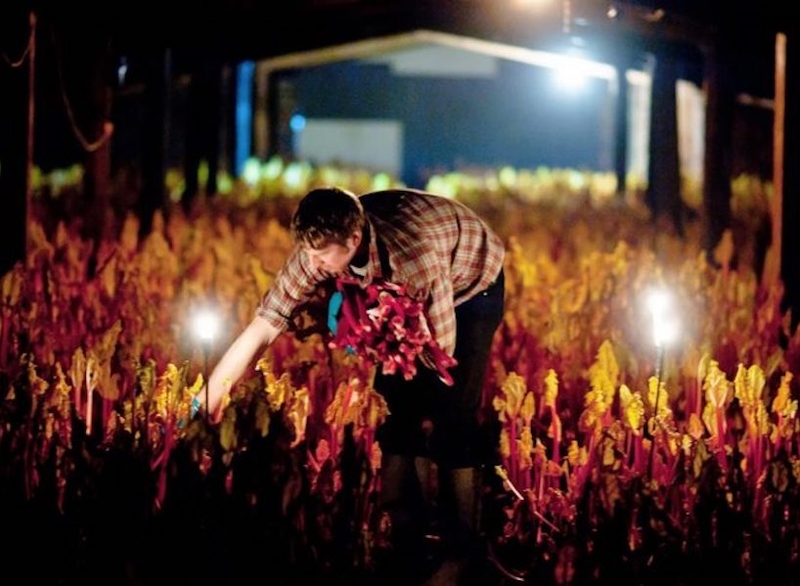
After the war, tastes and markets faltered, leaving around a dozen families farms to champion this miraculous ingredient. Drive through the winding countryside between Carlton and Lofthouse and you might spot a handful of the forcing sheds, inconspicuous looking wooden or brick hangers housing hundreds of blushing tendrils underneath. Workers still harvest by candlelight to preserve the vivacity of the curled yellow leaves, and caterpillars are even introduced to convince the plants that Spring has sprung.
In 2010, the Rhubarb Triangle was rightly awarded the European Protected Designation of Origin status, and an annual festival has been curated in late February to pay homage to all things fabulous and fuchsia.
This year, from Friday 17 February- Sunday 19 February 2023, Wakefield City Centre will be alive with market stalls, chef demonstrations, music and arts activities for all ages. Expect even more chalets where you can get your hands on armfuls of pink sticks for your crumble, plus a plethora of jams, gins, pies and pastries.
No doubt Cryer & Stott will be back with their Rhubarb infused Wensleydale, and you’ll be sampling plenty of ruby liqueur Rhucello.
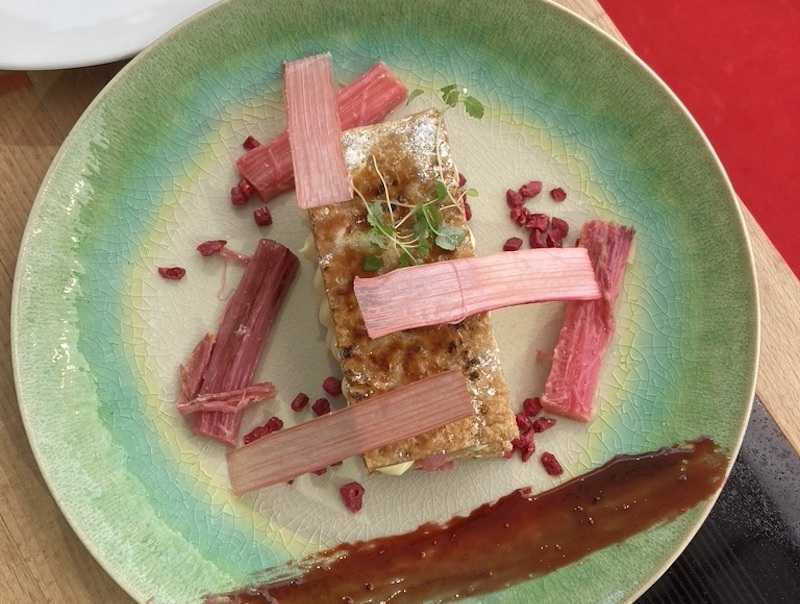
Cafes, bars and restaurants across Wakefield will be taking part in the Rhubarb Food & Drink Trail, a chance to taste the sweet-sour vegetable in cakes, cocktails and dishes from the sublime to the unexpected. Chefs will be testing their innovation skills in the demonstration tent curated and hosted by Yorkshire Food Guide, where you can learn a new rhubarb recipe or two.
Catch the ‘spicy flexitarian’ and MasterChef finalist Radha Kaushal-Bolla, Great British Bake Off 2021 finalist Crystelle Pereira, local cook and columnist Karen Wright (Great British Bake Off) and Bobby Geetha from BBC’s Great British Menu. Try some Thai treats from Têt Restaurant, and bakes from The Crows Rest Artisan Bakehouse and Farmer Copleys.
There are countless ways to prepare Rhubarb, but locals will remind you that the best way to eat it is straight from the brown paper bag, and dunked into sugar. One of the wonderful traditions from the Triangle worth shining a light on for the world to see. Cut Yorkshire, and it really does bleed Rhubarb.
Rhubarb Festival
When? Fri 17 February 2023 - Sun 19 February 2023, 10am - 5pm
Where? Wakefield City Centre



